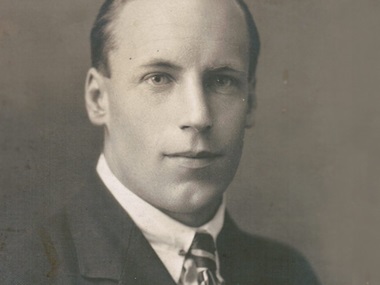
This is the image of Eric Liddell that fellow prisoner of war John Hoyt has posted on his site.
The Paris 2024 Olympics begin one month from now. While we look forward with anticipation, this is also a good time to enjoy a unique anniversary. Eric Liddell won gold 100 years ago, at the 1924 Paris Olympic Games.
Liddell gained celebrity because of his athletic prowess (he also played for the Scottish national rugby team), and is still remembered because his Olympic victory was re-told in the film Chariots of Fire.
Less well known is his return to the nation of his birth, China, where he served as a missionary from 1925 until his death in a Japanese prisoner of war camp southeast of Beijing in 1945.
Here I will look at a local man’s reflections on his time at Weixian (Weihsien) Internment Camp with Liddell, then add my write-up on For the Glory: Olympic Legend Eric Liddell’s Journey of Faith and Survival.
A boy’s memories
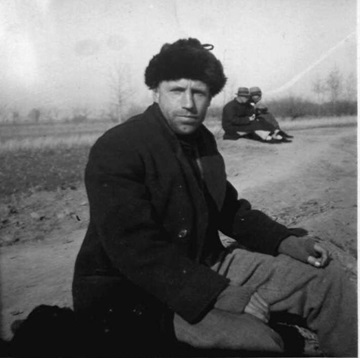
Eric’s brother Rob (Robin), a medical missionary himself, took this photo en route to a rural mission in Xiaochang in 1937, where Eric served the poor.
Following is a portion of John Hoyte’s portrait of Liddell, from Hoyte’s website:
My eldest brother, Robin, slept in the same dormitory as Eric. He . . . introduced me to Eric. He was 42, had a spring in his step and a friendly smile. I was 11 and feeling quite insignificant as ‘Hoyte four’ [fourth sibling] in the camp boarding school.
But Eric took an interest in me and spoke to me with such ease and informality that I suddenly felt important. That was his nature for he loved kids and would do anything he could to give us ‘orphans,’ separated from our parents, a sense of self-worth in spite of the misery of the camp.
Robin was quite proud of sharing the dormitory with the Olympic hero and I could understand why. If we were without our parents, Eric was without his wife and daughters who were now in Canada on their way to Scotland, so he understood our longings. The separation must have been hard for him but it did not show in his zest for life and creative living. His face was distinctive in that he had a pronounced dimple in the middle of his chin.
As an outstanding athlete, Eric was modest about his gold medal and would play down the honor though this led to him giving talks in the camp on the running world, competition, ambition, painful training, sacrifice for excellence, the temptation to pride and his vibrant faith.
His calling could be: running a race for his country, being a missionary teacher in the Anglo-Chinese College in Tientsin or, if confined to a prison camp, to teaching mathematics at the camp school and keeping up the morale of young people.
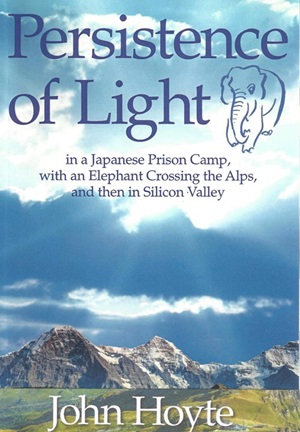 It became apparent that for him the three and a half years of confinement were the very opposite to being wasted. Running for him was integral to his faith, an extension of his being, and for him there was no difference between the secular and the sacred.
It became apparent that for him the three and a half years of confinement were the very opposite to being wasted. Running for him was integral to his faith, an extension of his being, and for him there was no difference between the secular and the sacred.
He was overflowing with good humor and love of life and devoting his time to being involved with us young people. We called him Uncle Eric. He organized games, particularly field hockey, planned square dances, chess tournaments and debates and seemed tireless in everything he did.
He was ‘a man for others,’ and no one else in the camp could match his caring spirit.
John Hoyte’s own story is pretty impressive too. His 2018 memoir, Persistence of Light describes his boyhood in China (including the portion above), how he led a British expedition with an elephant over the Alps in Hannibal’s tracks following his time at Cambridge University, and his life as an entrepreneur in Silicon Valley.
Hoyte is married to poet Luci Shaw. They live just across the border in Bellingham, but are well acquainted with the Vancouver area. Shaw has made many presentations at Regent College, and Hoyte launched his book there; I’m sure it can be purchased at Regent Bookstore.
To learn more about John Hoyte go to his site.
For the Glory
Following is a piece I wrote, just before the Brazil 2016 Olympics, about a biography of Eric Liddell which did a good job of covering both his athletic prowess and his life as a missionary
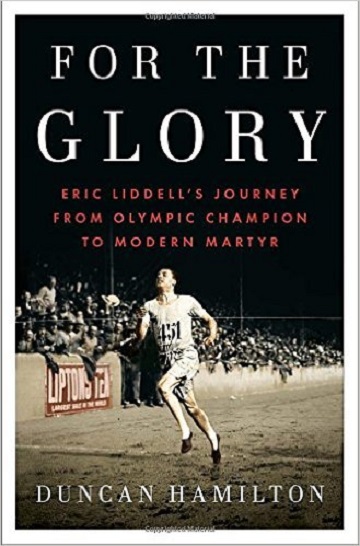 A new book by Duncan Hamilton – For the Glory (subtitled ‘Olympic Legend Eric Liddell’s Journey of Faith and Survival’) – tells the full story of a man whose life is already known, to a degree, through the Oscar-winning film Chariots of Fire.
A new book by Duncan Hamilton – For the Glory (subtitled ‘Olympic Legend Eric Liddell’s Journey of Faith and Survival’) – tells the full story of a man whose life is already known, to a degree, through the Oscar-winning film Chariots of Fire.
What most of us already know goes like this, in the publisher’s words:
Famously, Liddell would not run on Sunday because of his strict observance of the Christian sabbath so he did not compete in his signature event, the 100 metres, at the 1924 Paris Olympics.
He was the greatest sprinter in the world at the time, and his choice not to run was ridiculed by the British Olympic committee, his fellow athletes and most of the world press. Yet Liddell triumphed days later in a new event, winning the 400 metres.
For the Glory clears up misconceptions from the movie, but the final impression isn’t really that much different. Liddell was a serious student at the University of Edinburgh, he loved to run, he was a very active Christian all the way along . . . and he was determined to get back to China.
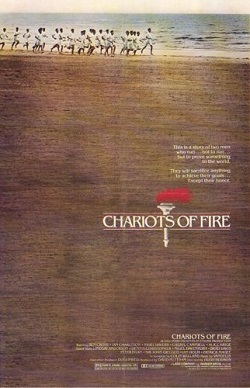 Chariots of Fire focused on Liddell’s Olympic journey. The final words on the screen were ominous, but barely hinted at the significance of his future life:
Chariots of Fire focused on Liddell’s Olympic journey. The final words on the screen were ominous, but barely hinted at the significance of his future life:
ERIC LIDDELL, MISSIONARY, DIED IN OCCUPIED CHINA AT THE END OF WORLD WAR II. ALL OF SCOTLAND MOURNED.
Liddell did, if fact, spend most of the rest of his life in China, where he had been born to missionary parents in 1902.
Hamilton says: “From infancy, Liddell had a bond with the Chinese that went far beyond the fact of his birth in the country and the hymns his father sang for it.” He devoted his life to China, right up to the day he died in a Japanese prisoner of war camp in 1945.
Hamilton is well established as a British sports writer, the author of several biographies, including one of storied footballer George Best. Though he gives no particular indication that he is a Christian himself, he is unstinting in his praise for Liddell as a sportsman:
Asked about his triumph in its immediate aftermath, the popular man of Paris was shyly circumspect. Not wanting to boast or gloat, Liddell claimed, as if regarding himself as an accidental champion, that he’d been “very fortunate” to have “touched the top of my form at just the right moment.” However fortunate he felt, the Olympics were more fortunate still to have him on the roll of honor. He was a poster boy, and how sorely the Games needed him. . . .
An easy, but horribly flawed, assumption was made about him because of his character. His expression of religious faith was perceived as a sign of innate weakness. Because of his decision not to compete on a Sunday, Liddell was dismissed as a pacifist in top competition – a man with a soft center. The notion was ludicrous.
Once, pointedly asked how he won races so often against the odds, Liddell answered: “I don’t like to be beaten.” On the track Liddell knew where to find the opposition’s jugular – and he also knew how to rip it out. Paris was a test of temperament for Liddell long before it became a test of speed, requiring qualities no one could coach: fortitude, integrity, forgiveness, stoicism, will. You either possessed these or you didn’t.
His admiration for Liddell as a missionary servant leader in China is even more apparent:
Before internment, [Liddell] worked in perilous outposts in China, dodging bullets and shells and always wary of the knife blade. After it, he dedicated himself to everyone around him as though it were his responsibility alone to imbue the hardships and degradations with a proper purpose and make the long days bearable. . . .
Liddell was officially the math and science teacher. He was unofficially everything else.
Noting the challenges of camp life (“The claustrophobic conditions brought predictable consequences. . . . There were disagreements, also frequently violent, over privacy and personal habits and hygiene as well as perceived idleness, selfishness and pilfering . . .”), Hamilton points out:
Liddell was different. He overlooked the imperfections of character that beset even the best of us, doing so with a gentlemanly charm. . . .
Skeptical questions are always going to be asked when someone is portrayed without apparent faults and also as the possessor of standards that appear so idealized and far-fetched to the rest of us. Liddell can sound too virtuous and too honorable to be true, as if those who knew him were either misremembering or consciously mythologizing.
Not so. The evidence is too overwhelming to be dismissed as easily as that. Amid the myriad moral dilemmas in Weihsien, Liddell’s forbearance was remarkable. No one could ever recall a single act of envy, pettiness, hubris or self-aggrandizement from him. He bad-mouthed nobody. He didn’t bicker. He lived daily by the most unselfish credo, which was to help others practically and emotionally.
Liddell became the camp’s conscience without ever being pious, sanctimonious or judgmental. He forced his religion on no one. He didn’t expect others to share his beliefs, let along live up to them. . . .
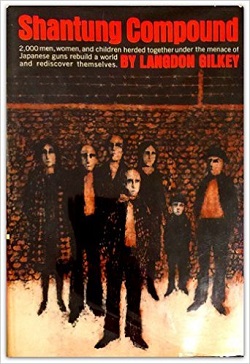 Hamilton is by no means uniformly supportive of missionary practices, several times commenting critically about Liddell’s group, the London Missionary Society.
Hamilton is by no means uniformly supportive of missionary practices, several times commenting critically about Liddell’s group, the London Missionary Society.
No doubt he appreciated the perspective of Langdon Gilkey, a young American teacher who was imprisoned with Liddell and went on to write an excellent account of the Weihsien experience in Shantung Compound (and teach theology at the University of Chicago Divinity School).
While acknowledging that “on the whole the missionaries were more honest and cooperative than any parallel secular group,” he was less impressed by the Protestants than by the Catholic fathers, who he said “played a most creative role in our camp life.”
Of the Protestants, he said:
Although they did try to be friendly, the Protestants nevertheless typically huddled together in a compact ‘Christian remnant.’ Not unlike the Pharisees in the New Testament, they kept to their own flock of saved souls, evidently because they feared to be contaminated in some way by this sinful world which they inwardly abhorred.
Not so Eric Liddell. Gilkey said this of him (though he used the name ‘Eric Ridley’; he changed all names “to save embarrassment all around.”)
The man who more than anyone brought about the solution of the teen-age problem [some quite unfettered sexual activity among young teens] was Eric Ridley. It is rare indeed when a person has the good fortune to meet a saint, but he came as close to it as anyone I have ever known. Often in an evening of that last year I (headed for some pleasant rendezvous with my girl friend) would pass the game room and peer in to see what the missionaries had cooking for the teen-agers.
As often as not, Eric Ridley would be bent over a chessboard or a model boat, or directing some sort of square dance absorbed, warm and interested, pouring all of himself into this effort to capture the minds and imaginations of those penned-up youths. . . .
If there were any evidences of the grace of God observable on the surface of our camp existence, they were to be found there.
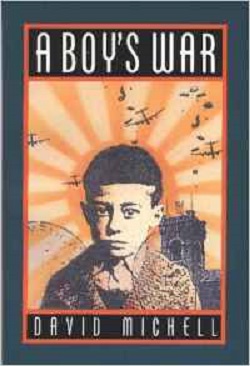 David Michell (whose parents were with China Inland Mission) experienced Weihsien as a boy, and came away with the same view of Liddell. He wrote in A Boy’s War:
David Michell (whose parents were with China Inland Mission) experienced Weihsien as a boy, and came away with the same view of Liddell. He wrote in A Boy’s War:
Weihsien was a place of heroes . . . But among many, one hero stands out . . .
Eric Liddell was a name that everybody in camp soon got to know. Simply because of his Olympic achievements he was everybody’s hero. Yet he didn’t in any sense rest on his laurels but carried heavy responsibilities and was an outstanding example by his kindness and self-sacrifice.
He taught science to the older students, even drawing all the apparatus for chemistry experiments so that the Oxford exams could be taken.
He put up a shelf – a valuable piece of furniture even if it was only a piece of wood – for a White Russian prostitute in the camp. She said of Eric that he was the only man who ever did anything for her without asking for favors in return.
Often we would see him carrying a heavy load for one of the older people or walking the camp paths with a young person for whom Weihsien imprisonment had brought life to a dead stop. He helped to answer questions, and turn the questioning to faith in God and hope that freedom would indeed come someday and with it the chance for education, a profession, marriage and a normal life. . . .
Strong as he was in his conviction about Sunday not being a day for sports, he even agreed to referee the games of some of the children whose parents let them play on Sundays, when he found them fighting over the game.
Thus it was a shock when Liddell, just 43 years old, died on February 21, 1945, seven months before the prisoners were released from the camp. He had been weakened by what turned out to be a tumor in his brain, but most thought he was too tough to succumb to illness. His own stiff upper lip muscular Christian outlook – possibly, ironically, one of his few weaknesses – caused him to downplay serious signs of illness.
“The entire camp, especially its youth, was stunned for days,” said Gilkey, “so great was the vacuum that Eric’s death had left.” Hamilton said Liddell’s roommates were fulsome in their praise, referring to the best tribute paid by one of them: “For over a year six of us have lived together like brothers and we all looked on Eric as our older brother.”
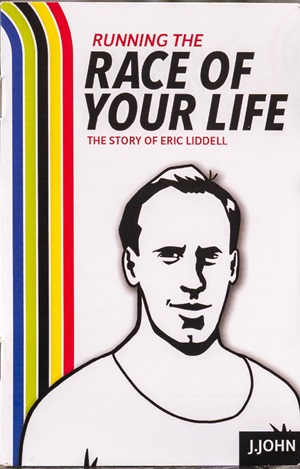 A Chinese-made ‘sequel’ to Chariots of Fire was just released – but it sounds well worth avoiding, if it ever does land on our shores. A review in South China Morning Post said:
A Chinese-made ‘sequel’ to Chariots of Fire was just released – but it sounds well worth avoiding, if it ever does land on our shores. A review in South China Morning Post said:
Liddell’s fervent Christian beliefs are downplayed to such a degree it appears his devotion and self-sacrifice is for China rather than the Almighty. . . . Not even Joseph Fiennes, as Liddell, can rise above a procession of incompetent performances and a head-thumpingly bad script. . . . Poorly conceived and wretchedly executed from start to finish, The Last Race is a strong contender for worst film of the year.
A better bet might be to watch Chariots of Fire and then The Story of Eric Liddell a YouTube video.
Two sites to check out during the Olympics:
- On the Scottish Parliament site: Eric Liddell: Legacy of an Olympic Champion – an exhibition runs from July 25 – September 12
- Canon J. John has created a booklet to mark the 100th anniversary of the Paris Olympics: Running the Race of Your Life: The Story of Eric Liddell

Thanks, Flyn, for this thoughtful reflection on Eric Liddell and the 1924 Olympics. You may remember my Light Magazine article on Eric Liddell: https://lightmagazine.ca/eric-liddells-fiery-chariots/
I also wrote a Light Magazine article on Dr. Neil Yorkston, the head of UBC Psychiatry who had Eric Liddell as his teacher and mentor in the Japanese internment camp. https://lightmagazine.ca/giving-thanks-for-dr-neil-yorkston-a-prayer-warrior-with-a-gracious-spirit/
Thank you for those links Ed. Great articles. It’s amazing how broad Eric’s influence has been.